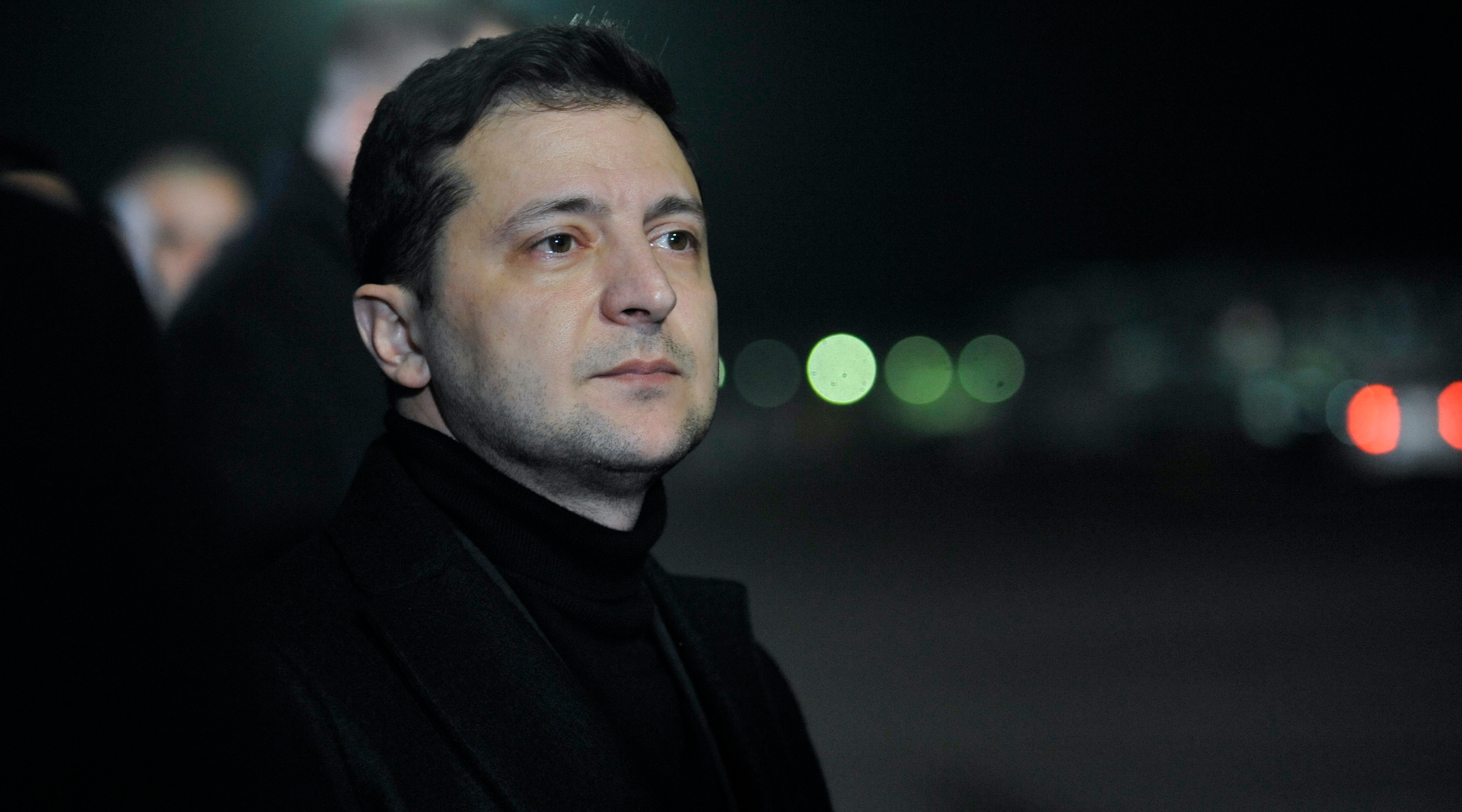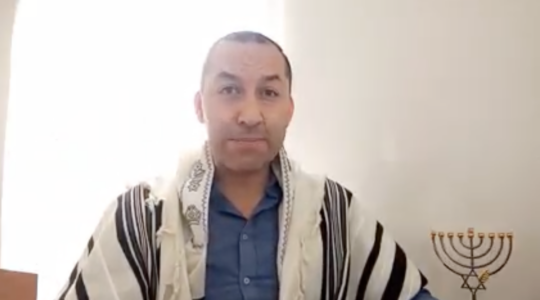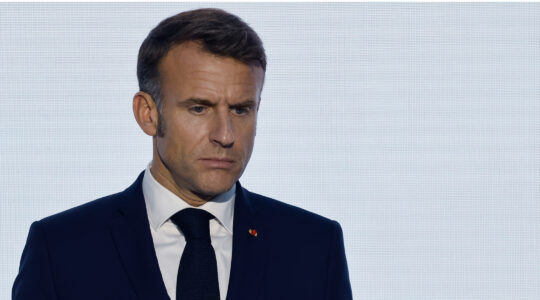(JTA) — President Volodymyr Zelensky of Ukraine extolled Israelis as a “united, strong, powerful” and “unique” people in his first interview for an Israeli publication.
The Times of Israel published the interview with the Jewish Zelensky on Sunday ahead of his arrival in Israel to attend the World Holocaust Forum, an international event in Jerusalem commemorating the 75th anniversary of the liberation of the former Auschwitz Nazi death camp in occupied Poland. Israeli President Reuven Rivlin is hosting the event on Thursday.
“The Jews managed to build a country, to elevate it, without anything except people and brains,” Zelensky, an actor who was elected in May, told The Times of Israel.
“The Jewish people in Israel is a unique people, a unique population. It has economic strength. There are many countries in the world that can protect themselves, but Israel, such a small country, can not only protect itself, but facing external threats, can respond.”
Despite “being under the threat of war, they enjoy every day,” Zelensky added. “I’ve seen it.”
Zelensky said he visited Israel many times when he was an actor.
“I have relatives there — an aunt of my mother, and her relatives. They moved to Israel, some of them, about 10-15 years ago. Maybe longer. At the end of the ’90s,” he told The Times of Israel. “So I was in Israel many times. For meetings, business meetings, TV meetings and concerts — in my previous life.”
Asked whether he did comedy there, Zelensky answered: “Yes. In Tel Aviv, in Beersheva, in Haifa, in Jerusalem. In so many cities. So I know Israel. I know people there.”
Zelensky said he believes he should have been invited to speak at this week’s ceremony at the Yad Vashem memorial museum, since more than a million Ukrainian Jews were murdered in the Holocaust. He was not invited to speak alongside other leaders such as French President Emmanuel Macron and Russian President Vladimir Putin.
On the glorification of Nazi collaborators in Ukraine, which recently has caused diplomatic discord between Israel and Ukraine, Zelensky said the issue was “very complicated and sensitive.” He stopped short of condemning such glorification, but said he would rather see other people celebrated as heroes.
“Let’s find those people whose names do not cause controversy in our present and in our future. Let’s name the monuments and streets for those people whose names do not provoke conflict,” he said.
Across Ukraine, local governments have named streets for collaborators like Stepan Bandera and Andryi Melnyk, whose troops killed thousands of Jews. A law from 2015 makes it illegal to “insult their memory.” The nationalists who fought alongside Nazi Germany are seen by many as courageous patriots also for taking up arms against the Soviet Union.
Zelensky in the interview cited a Pew Research Center survey from 2018 that he said “assessed the level of anti-Semitism in Europe and the lowest level of anti-Semitism was in Ukraine.”
He apparently was referencing “Religious Belief and National Belonging in Central and Eastern Europe,” a 2017 project that in fact dealt with attitudes toward religion. In the study, Ukrainians and Estonians were rated the most tolerant when it came to welcoming Jews as fellow citizens. However, some 29 percent of Ukrainian respondents still said they opposed having Jews in their family and 13 percent said they would not like Jewish neighbors.
In a 2019 Anti-Defamation League survey that did set out to measure anti-Semitism, 46 percent of Ukrainian respondents expressed anti-Semitic views – an increase of 14 points from a survey the ADL performed there in 2015. Of the 18 countries surveyed that year, Ukraine had the second highest prevalence, trailing Poland by 2 percentage points.
In the interview, Zelensky also was asked about his family’s history.
“On my father’s side, my grandfather and his three brothers were all on the front [in the Red Army] in World War II and only he returned,” he said. “My grandmother was living in Kryvi Rih, in a part of south Ukraine which was occupied by the fascists. They killed all the Jews who remained. She had left in an evacuation of Jews to Almaty, Kazakhstan. Many people fled to there. She studied there. She’s a teacher. After World War II, she came back. That’s where I was born.”
His family was “not Orthodox.”
“An ordinary Soviet Jewish family. Most Jewish families in the Soviet Union were not religious,” Zelensky said. “You know religion didn’t exist in the Soviet state as such.”
A July phone call to Zelensky from President Donald Trump is at the center of the impeachment proceedings now taking place in the United States. Trump is alleged to have asked Zelensky to dig up dirt on the Ukraine business actions of Hunter Biden, the son of Joe Biden, the Democratic presidential contender.
“I didn’t do anything illegal,” Zelensky told The Times of Israel. “I had phone calls with the president of the United States. As the president of Ukraine, I did what I could do as the president of Ukraine to have a good, reliable and strong relationship with one of our strategic partners, the United States of America.
The Ukrainian leader went to say of the U.S.: “It is their country, and they treat their country the way they like it. And I do not want them to involve us in any case related to their internal politics.”
JTA has documented Jewish history in real-time for over a century. Keep our journalism strong by joining us in supporting independent, award-winning reporting.






